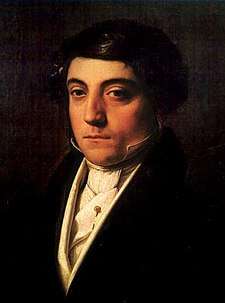Eduardo e Cristina
Eduardo e Cristina (Italian pronunciation: [eduˈardo e kriˈstiːna]) is an operatic 'dramma' in two acts by Gioachino Rossini to an Italian libretto originally written by Giovanni Schmidt for Odoardo e Cristina (1810), an opera by Stefano Pavesi, and adapted for Rossini by Andrea Leone Tottola and Gherardo Bevilacqua-Aldobrandini.
| Eduardo e Cristina | |
|---|---|
| Opera by Gioachino Rossini | |
 Portrait of the composer | |
| Librettist | Giovanni Schmidt |
| Language | Italian |
| Premiere | |
This pastiche work was composed in a great hurry for a first performance arranged less than a month after the premiere of Ermione. Rossini borrowed "19 of the 26 musical numbers"[1] from his other works, including Adelaide di Borgogna, Ricciardo e Zoraide, as well as Ermione itself.
The opera was first performed at the Teatro San Benedetto, Venice, on 24 April 1819 and given 24 performances that season before being revived the following year at the more prestigious La Fenice.[2] Ironically, while Ermione was not particularly well received, "Eduardo e Christina was a huge success".[2] Apparently, the first performance was so well received that it took six hours, given the large number of encores.[3]
Performance history
The opera received productions elsewhere in Europe up to 1840, but after that they seem to have been very rare.[2] It was given on 25 November 1834 in New York,[3] Unlike most Neapolitan operas by Rossini, this one was "heavily altered from revival to revival"[3]. Among other productions, the opera was performed at the Rossini in Wildbad festival in 2017.[4]
Roles
| Role | Voice type | Premiere Cast, 24 April 1819 (Conductor: ) |
|---|---|---|
| Carlo, King of Sweden | tenor | Eliodoro Bianchi |
| Cristina, his daughter, secret wife of Eduardo | soprano | Rosa Morandi |
| Eduardo, general of the Swedish army | contralto | Carolina Cortesi |
| Giacomo, royal prince of Scotland | bass | Luciano Bianchi |
| Atlei, captain of the guard, friend of Eduardo | bass | Vincenzo Fracalini |
| Gustavo, small child of Eduardo and Cristina | silent | |
Synopsis
- Place: Sweden
- Time: "The distant past"[1]
Eduardo, commander of the Swedish army, brings news of peace and is greeted triumphantly by King Carlo in Stockholm. That same day, the king announces that his daughter, Cristina, is to be married to Prince Giacomo of Scotland. Cristina, however, is already secretly Eduardo’s wife, and together they have a young son, Gustavo. Christina makes plans to escape, but during the wedding preparations little Gustavo is discovered. Cristina proclaims herself his mother, though she will not reveal the father’s name. When Eduardo appears, he reveals himself to be the boy’s father, and the illicit couple are led off to prison. Cristina continues to refuse a proposal of marriage to Giacomo, even though he has agreed to recognize Gustavo as his own son. Eventually Eduardo is freed by his friend and comrade in arms, Captain Atlei, and together they defeat a surprise attack by the Russians. After the battle, Eduardo hands his sword to King Carlo who, touched, forgives the couple and grants them his blessing.
Recordings
| Year | Cast (Carlo, Cristina, Eduardo, Giacomo, Atlei) |
Conductor, Opera House and Orchestra |
Label[5] |
|---|---|---|---|
| 1997 | Omar Jara, Carmen Acosta, Eliseda Dumitru, Konstantin Gorny, Jorge Orlando Gómez | Francesco Corti, I Virtuosi di Praga (Recording of a performance at the Rossini in Wildbad Festival, July) |
Audio CD: Bongiovanni Cat: GB 2205/2206-2 |
| 2019 | Kenneth Tarver, Silvia Dalla Benetta, Laura Poverelli, Baurzhan Anderzhanov, Xiang Xu |
Gianluigi Gelmetti, Virtuosi Brunensis,Poznań Camerata Bach Choir |
Audio CD:Naxos Records Cat:8.660466-67 |
References
Notes
- Osborne, Charles 1994, p. 92
- Osborne, Charles 1994, p. 93
- Gossett and Brauner 2001, p. 785
- "Rossini-Festival 2017: Eduardo e Cristina". www.bad-wildbad.de. Retrieved 8 April 2018.
- The single recording of Eduardo e Cristina as listed on operadis-opera-discography.org.uk
Cited sources
- Gossett, Philip; Brauner, Patricia (2001), "Eduardo e Cristina" in Holden, Amanda (ed.), The New Penguin Opera Guide, New York: Penguin Putnam. ISBN 0-14-029312-4
- Osborne, Charles (1994), The Bel Canto Operas of Rossini, Donizetti, and Bellini, London: Methuen; Portland, Oregon: Amadeus Press. ISBN 0931340713
Other sources
- Casaglia, Gherardo (2005)."Eduardo e Cristina, 24 April 1819". L'Almanacco di Gherardo Casaglia (in Italian).
- Osborne, Richard (1990), Rossini, Ithaca, New York: Northeastern University Press. ISBN 1-55553-088-5
- Osborne, Richard (1998), "Eduardo e Cristina", in Stanley Sadie, (Ed.), The New Grove Dictionary of Opera, Vol. Two, p. 20. London: Macmillan Publishers, Inc. ISBN 0-333-73432-7 ISBN 1-56159-228-5??
External links
- Libretto in Italian Retrieved 13 December 2012